AI Travel Planning: How to Utilize AI for Your Vacation
Artificial intelligence is transforming the way we plan and experience travel, making it easier than ever to organize the perfect getaway. With AI's advanced capabilities, you can now personalize your vacation planning, from finding unique destinations to adjusting your itinerary on the fly. This article delves into how AI can enhance your travel planning, the tools you should consider, and how AI is integrated into travel apps. We'll also explore the advantages of using AI for translation and adapting schedules in real-time.
How AI Enhances Travel Planning
Finding Your Perfect Travel Destinations
AI is fantastic at analyzing vast amounts of data to pinpoint destinations that align with your interests and past activities. It's like having a personal travel agent who knows exactly what you love. By looking at your travel history, preferred activities, and even your social media posts, AI can suggest places you might not have considered on your own. This level of personalization means you're not just sticking to the usual tourist spots but discovering hidden gems that truly resonate with you.
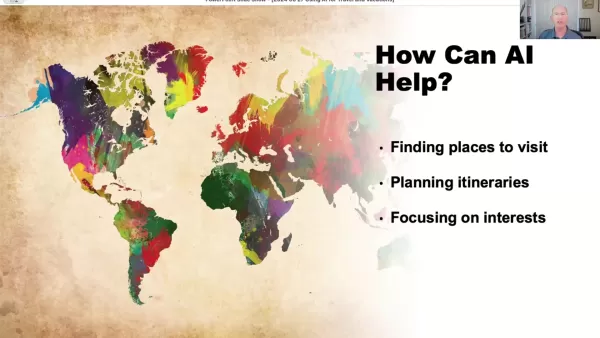
Key Benefits of AI for Destination Discovery:
- Personalized Recommendations: AI tailors suggestions to your unique profile, ensuring you get recommendations that truly fit your tastes.
- Discover Hidden Gems: With AI, you can uncover off-the-beaten-path destinations that match your niche interests.
- Time Efficiency: AI saves you time on research, letting you focus on the excitement of your upcoming trip.
What's more, AI continuously learns and adapts, so its recommendations become increasingly accurate. It considers not just where to go, but also the best times to visit, taking into account weather, local events, and crowd levels. This detailed approach ensures your travel experience is optimized to perfection, making planning both accessible and enjoyable for everyone.
Crafting Detailed Itineraries with AI
Once you've chosen your destination, AI can help you create a comprehensive itinerary. AI-powered tools can optimize your route between attractions, suggest activities based on your schedule, and consider transportation options. This means you can see more without feeling rushed, as every part of your itinerary is tailored to your needs.
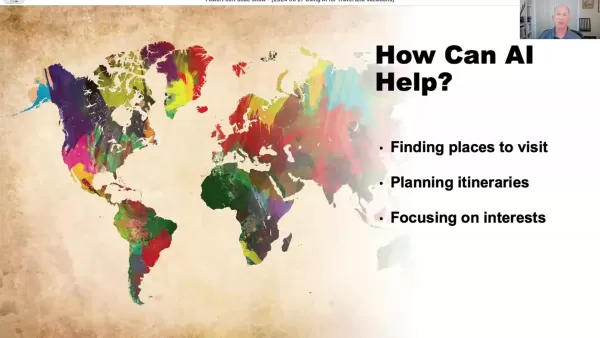
Practical Tips for AI Itinerary Planning:
- Provide detailed preferences, including your interests and activity level.
- Specify any time constraints or desired pace.
- Let AI suggest the best routes and activity sequences.
AI can manage complex scheduling, factoring in travel times, attraction opening hours, and even the best times for meals. This level of planning prevents logistical headaches, allowing you to fully enjoy your vacation.
Adjusting Schedules on the Go
Travel plans often need adjustments due to unexpected delays or changes in weather. AI can adapt your schedule in real-time, suggesting alternative routes, activities, or even new destinations based on current conditions. This flexibility turns potential travel disruptions into opportunities for new adventures.
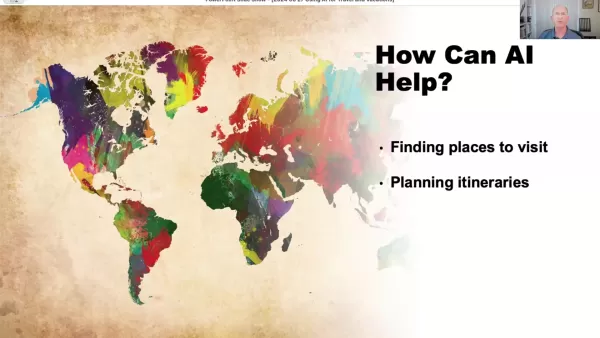
AI Real-Time Adaptations:
- Suggest alternative routes for travel delays.
- Recommend different activities due to weather changes.
- Adapt to your evolving mood and desires.
AI's proactive problem-solving identifies potential issues in advance and offers solutions, minimizing stress from unexpected setbacks.
Exploring Your Interests with AI
AI can dive deep into your specific interests, whether it's history, art, cuisine, or outdoor adventures. It curates experiences that align with your passions, going beyond generic recommendations to offer insights into local cultures and hidden gems. Imagine having a personal curator who knows exactly what excites you, enriching your travel experiences.
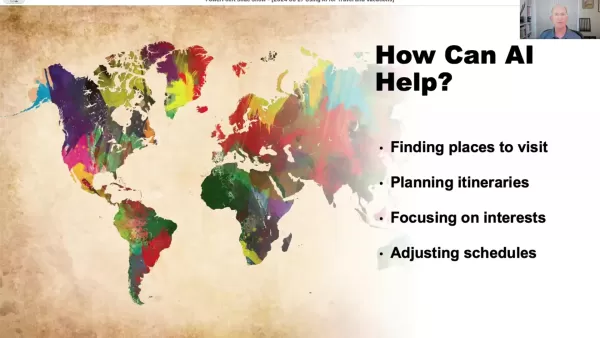
AI-Driven Interest Exploration:
- Explore your passions and interests in depth.
- Discover unique local cultures and hidden gems.
- Add context, history, and cultural significance to your travels.
Example Use-Cases:
- Find obscure historical sites based on niche interests.
- Curate culinary experiences with local food experts.
- Suggest outdoor adventures that match your skill levels.
Breaking Down Language Barriers with AI
Language barriers can be a major hurdle when traveling internationally. AI-powered translation tools make communication easier, allowing you to interact with locals, read menus, and navigate new environments. These tools are becoming more sophisticated, offering real-time translation, voice-to-text capabilities, and even the ability to understand unfamiliar dialects.

Key Features of AI Translation Tools:
- Real-time translation for conversations.
- Voice-to-text to easily convey messages.
- Decipher unfamiliar dialects and regional phrases.
Emerging Trends:
- AI technology improving language accuracy.
- Smartphones offering on-device translation.
- Seamless communication while traveling abroad.
AI Integration in Travel Apps
Enhancing Travel Apps with AI
Many travel apps now incorporate AI to enhance their planning capabilities. These apps can predict flight delays, suggest optimal booking times, and provide personalized recommendations for activities and restaurants. AI integration makes the travel app experience more intuitive and efficient, giving travelers more control and reducing stress.
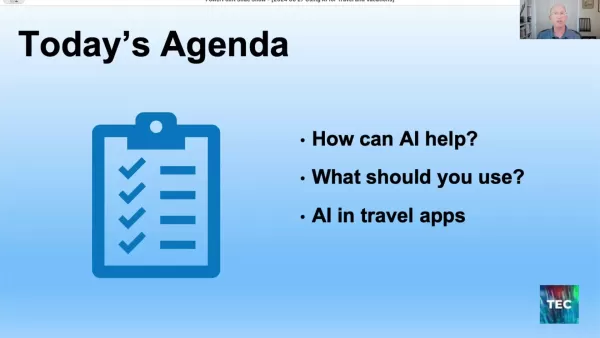
AI Integrations:
- Predictive Analysis: Forecast flight delays and suggest optimal booking times.
- Personalized Recommendations: Offer curated suggestions for activities and restaurants.
- Real-Time Assistance: Provide rapid solutions to travel challenges.
Example App:
Many travel apps are already integrating AI, such as Culture Trip, Wanderlog, and Roam Around, making planning more seamless and enjoyable.
Maximizing AI in Travel Planning
Choosing the Right AI Tools
Selecting the right AI tools is crucial for effective travel planning. Evaluate your needs and choose tools that align with your goals, whether it's finding the best deals, creating a comprehensive itinerary, or getting real-time translation. A thoughtful selection process ensures you make the most of AI's capabilities for a smoother and more personalized travel experience.
Consider factors like ease of use, accuracy of recommendations, and integration with other travel platforms when choosing AI tools. Don't hesitate to try out multiple options before settling on the ones that best suit your preferences. This hands-on approach helps you make informed decisions.
Top-Rated AI Tools:
- Copilot (Microsoft): Helps with researching and planning.
- Gemini (Google): Excels in providing personalized travel recommendations.
- ChatGPT: Can generate creative travel itineraries and suggestions.
- Perplexity: Summarizes travel information and insights.
- Claude (Anthropic): Provides detailed travel plans.
Crafting Effective Prompts
The quality of AI recommendations heavily depends on the prompts you provide. Clear, specific prompts lead to more accurate and relevant results. Be as detailed as possible about your interests, preferences, and constraints. Mastering the art of prompt engineering can transform AI from a generic tool into a personalized travel assistant.
Experiment with different phrasing and levels of detail to refine your prompt-writing skills. The more you interact with AI, the better it becomes at understanding your needs and delivering valuable suggestions. This iterative process enhances your ability to harness AI for exceptional travel planning.
Effective Prompt Examples:
- 'Suggest family-friendly activities in Rome with kids.'
- 'Recommend eco-friendly resorts in Costa Rica with wellness programs.'
- 'Generate a 5-day hiking itinerary in the Swiss Alps for experienced hikers.'
Prompt Refinement:
- Iterate on prompts to improve AI understanding.
- Monitor AI responses for relevance and value.
- Refine your prompts over time for better insights.
Pricing Models for AI Travel Tools
Understanding the Costs
AI travel tools often come with free versions that provide basic planning functionality. Paid subscriptions offer more advanced features, such as priority access, personalized support, and ad-free experiences. This tiered pricing approach makes AI accessible to a wide range of travelers.
When considering paid subscriptions, think about your travel frequency and the complexity of your trips. If you're an occasional traveler, the free version might be enough. However, frequent travelers may find the enhanced capabilities and time-saving features of paid plans more beneficial.
AI Travel Tool Free Version Paid Subscription Key Benefits Copilot (Microsoft) Yes Yes Enhanced research and planning Gemini (Google) Yes Yes Prioritized support and personalized travel ChatGPT Yes Yes Premium customer services Perplexity Yes Yes More features Claude (Anthropic) Yes Yes Ad-free experiences and custom recommendations
Pros and Cons of Using AI for Travel Planning
Advantages of AI in Travel Planning
- Enhanced Personalization: AI tailors recommendations to your unique interests and preferences, ensuring each trip is custom-made.
- Improved Efficiency: AI streamlines the planning process, saving time and effort by automating tasks like itinerary creation and booking.
- Increased Flexibility: AI dynamically adjusts schedules based on real-time data, providing greater adaptability in the face of unexpected challenges.
- Enhanced Safety: AI tools can provide alerts about travel warnings or potential health dangers and help find alternative methods.
Disadvantages of AI in Travel Planning
- Privacy Concerns: The use of AI in travel planning raises privacy issues as AI collects and analyzes personal data to offer recommendations.
- Reliance on Technology: Over-dependence on AI may diminish the spontaneity and joy of serendipitous discovery while traveling.
- Cost Implications: While basic AI travel tools are often free, premium features and subscriptions can add to the overall cost of travel planning.
- Biases in Algorithms: AI algorithms may perpetuate biases and exclude certain destinations or activities based on existing data patterns.
Core Features of AI Travel Planners
Essential Features and Benefits
AI travel planners offer a range of core features that set them apart from traditional planning methods. From predictive analysis to personalized recommendations and real-time schedule adjustments, these tools enhance every aspect of travel planning. AI helps travelers make smarter decisions, delivering unprecedented value through enhanced efficiency and flexibility.
Key Features:
- Predictive Analysis: Anticipate travel disruptions and optimize booking times.
- Personalized Recommendations: Tailor suggestions for activities, restaurants, and accommodation.
- Real-Time Schedule Adjustment: Dynamically adapt itineraries based on current conditions and preferences.
- Seamless Integration: Integrate with travel platforms and apps.
Core Benefits of AI Travel Planners:
- Enhance efficiency and flexibility when planning your trip.
- Offer unprecedented levels of support when using AI.
Real-World Use Cases for AI Travel Planning
AI in Different Travel Scenarios
AI travel planning tools cater to a wide variety of scenarios, from family vacations to business trips and solo adventures. AI adapts to your unique needs and objectives, making every trip a tailor-made experience. The increased flexibility and precision of AI-driven plans enhance overall travel satisfaction.
Example Scenarios:
- Family Vacations: Tailored activities and safe venues for children.
- Business Trips: Efficient routing and comfortable accommodation.
- Solo Adventures: Flexible itineraries and local interactions.
Benefits for Use Cases:
- Provide increased precision of itineraries.
- Cater to diverse travel scenarios.
- Offer enhanced travel satisfaction.
Frequently Asked Questions about AI Travel Planning
How Does AI Personalize Travel Recommendations?
AI algorithms analyze your past travel data, preferences, and activity patterns to offer personalized destination and activity recommendations. The more data AI has, the more precise its suggestions become, ensuring your travel experiences align with your interests and expectations. This iterative process allows AI to fine-tune its recommendations for optimal personalization.
Can AI Adapt Travel Itineraries in Real-Time?
AI can dynamically adjust travel itineraries based on real-time data, such as flight delays, weather conditions, and traffic incidents. It offers alternative routes, activities, or accommodations to minimize disruption and maximize your travel enjoyment. With AI, unexpected challenges transform into opportunities for exploration and discovery.
What AI Tools Are Best for Travel Translation?
Several AI tools excel at travel translation, including Google Translate, Microsoft Translator, and iTranslate. These tools offer real-time translation, voice-to-text capabilities, and offline support, making communication seamless in international settings. By breaking down language barriers, AI-powered translation tools enhance cultural immersion and local interactions.
How Do I Choose the Right AI Travel Planning App?
Selecting the right AI travel planning app involves evaluating your specific needs, preferences, and technical proficiency. Consider factors such as ease of use, accuracy of recommendations, integration with travel platforms, and pricing models. Don't hesitate to try out multiple apps before settling on the one that best suits your requirements.
Are There Any Privacy Concerns with Using AI Travel Tools?
As with any technology that collects personal data, privacy concerns are valid when using AI travel tools. Review the privacy policies of the apps and platforms you use, and be mindful of the information you share. By exercising caution and adopting privacy-conscious practices, you can minimize the risks and enjoy the benefits of AI travel planning.
Related Questions about AI in Travel
What Future Advancements Can We Expect in AI Travel Planning?
Future advancements in AI travel planning promise even greater personalization, efficiency, and convenience. Expect more sophisticated predictive analytics, seamless integration with emerging technologies, and enhanced cultural immersion. AI will continue to revolutionize the travel experience, transforming how we plan, navigate, and connect with destinations around the world.
Emerging trends in travel AI:
- AI can help travelers find new places to visit.
- AI excels at planning itineraries and can adjust dynamically.
- With AI focusing on travelers' interests, the traveling experience becomes far more enjoyable.
These innovations are expected to reduce the stress associated with trip planning, making travel accessible and enjoyable for a wider audience.
Examples of potential advancements:
- Holographic tourism allows people to explore foreign countries from the comfort of their home.
- AI-powered personalized travel guide that recommends experiences based on your personality.
- Smart luggage systems that navigate airports autonomously.
Related article
 North.Cloud Secures $5M to Revolutionize Cloud FinOps with AI-Driven Operating System
North.Cloud Secures $5 Million Series A to Pioneer Next-Gen Cloud Infrastructure Management
Cloud optimization leader North.Cloud has announced a $5 million Series A funding round led by Companyon Ventures, fueling the rollout of its groundbreaking
North.Cloud Secures $5M to Revolutionize Cloud FinOps with AI-Driven Operating System
North.Cloud Secures $5 Million Series A to Pioneer Next-Gen Cloud Infrastructure Management
Cloud optimization leader North.Cloud has announced a $5 million Series A funding round led by Companyon Ventures, fueling the rollout of its groundbreaking
 Artifism Review: AI-Powered Content & Image Generator SaaS Script
In today's content-driven digital ecosystem, consistently producing high-quality materials presents significant challenges for creators and marketers alike. The Artifism AI Content & Image Generator SaaS script offers an innovative solution by automa
Artifism Review: AI-Powered Content & Image Generator SaaS Script
In today's content-driven digital ecosystem, consistently producing high-quality materials presents significant challenges for creators and marketers alike. The Artifism AI Content & Image Generator SaaS script offers an innovative solution by automa
 Google AI Ultra Unveiled: Premium Subscription Priced at $249.99 Monthly
Google Unveils Premium AI Ultra SubscriptionAt Google I/O 2025, the tech giant announced its new comprehensive AI subscription service - Google AI Ultra. Priced at $249.99 monthly, this premium offering provides exclusive access to Google's most adva
Comments (20)
0/200
Google AI Ultra Unveiled: Premium Subscription Priced at $249.99 Monthly
Google Unveils Premium AI Ultra SubscriptionAt Google I/O 2025, the tech giant announced its new comprehensive AI subscription service - Google AI Ultra. Priced at $249.99 monthly, this premium offering provides exclusive access to Google's most adva
Comments (20)
0/200
![BruceClark]() BruceClark
BruceClark
 April 24, 2025 at 6:15:25 AM EDT
April 24, 2025 at 6:15:25 AM EDT
AIトラベルプランニングを使って旅行を計画するのが楽しいです!ユニークな目的地を探すのが簡単で、計画もその場で調整できます。ただ、もっと詳細な情報が欲しいですね。😊🌍


 0
0
![DouglasAnderson]() DouglasAnderson
DouglasAnderson
 April 23, 2025 at 11:00:34 PM EDT
April 23, 2025 at 11:00:34 PM EDT
Mit AI Travel Planning ist das Planen meiner Reisen ein Kinderspiel! Es findet tolle Orte und passt meine Pläne spontan an. Schade, dass es keine Empfehlungen für lokale Aktivitäten gibt. 🚲🌄


 0
0
![JerryGonzález]() JerryGonzález
JerryGonzález
 April 22, 2025 at 9:54:22 AM EDT
April 22, 2025 at 9:54:22 AM EDT
AIを使った旅行計画は最高です!最後の旅行で使って、知らなかった隠れた名所を提案してくれました。旅程もその場で簡単に調整できました。ただ、予算旅行のオプションがもう少し欲しいですね。それでも、素晴らしいツールです!😊


 0
0
![RichardJohnson]() RichardJohnson
RichardJohnson
 April 22, 2025 at 6:22:25 AM EDT
April 22, 2025 at 6:22:25 AM EDT
AI Travel Planning은 내 휴가의 구세주예요! 이제 여행을 맞춤화하는 게 너무 쉬워졌어요, 멋진 장소를 찾고 계획을 즉시 조정할 수 있어요. 다만 기분 변화도 예측해줬으면 좋겠어요 😂. 그래도 여행자에겐 필수 앱이에요!


 0
0
![MarkGonzalez]() MarkGonzalez
MarkGonzalez
 April 22, 2025 at 3:20:43 AM EDT
April 22, 2025 at 3:20:43 AM EDT
AI Travel Planning is a lifesaver! I used it to plan my last trip and it suggested some hidden gems I'd never heard of. The itinerary was easy to adjust on the go. Only wish it had more options for budget travel, but still a solid tool! 😎


 0
0
![PaulAnderson]() PaulAnderson
PaulAnderson
 April 22, 2025 at 3:02:39 AM EDT
April 22, 2025 at 3:02:39 AM EDT
AI Travel Planning giúp tôi lên kế hoạch du lịch dễ dàng hơn! Nó tìm ra những địa điểm độc đáo và điều chỉnh lịch trình của tôi ngay lập tức. Chỉ mong nó có thêm thông tin về văn hóa địa phương. 🏯🌿


 0
0
Artificial intelligence is transforming the way we plan and experience travel, making it easier than ever to organize the perfect getaway. With AI's advanced capabilities, you can now personalize your vacation planning, from finding unique destinations to adjusting your itinerary on the fly. This article delves into how AI can enhance your travel planning, the tools you should consider, and how AI is integrated into travel apps. We'll also explore the advantages of using AI for translation and adapting schedules in real-time.
How AI Enhances Travel Planning
Finding Your Perfect Travel Destinations
AI is fantastic at analyzing vast amounts of data to pinpoint destinations that align with your interests and past activities. It's like having a personal travel agent who knows exactly what you love. By looking at your travel history, preferred activities, and even your social media posts, AI can suggest places you might not have considered on your own. This level of personalization means you're not just sticking to the usual tourist spots but discovering hidden gems that truly resonate with you.

Key Benefits of AI for Destination Discovery:
- Personalized Recommendations: AI tailors suggestions to your unique profile, ensuring you get recommendations that truly fit your tastes.
- Discover Hidden Gems: With AI, you can uncover off-the-beaten-path destinations that match your niche interests.
- Time Efficiency: AI saves you time on research, letting you focus on the excitement of your upcoming trip.
What's more, AI continuously learns and adapts, so its recommendations become increasingly accurate. It considers not just where to go, but also the best times to visit, taking into account weather, local events, and crowd levels. This detailed approach ensures your travel experience is optimized to perfection, making planning both accessible and enjoyable for everyone.
Crafting Detailed Itineraries with AI
Once you've chosen your destination, AI can help you create a comprehensive itinerary. AI-powered tools can optimize your route between attractions, suggest activities based on your schedule, and consider transportation options. This means you can see more without feeling rushed, as every part of your itinerary is tailored to your needs.

Practical Tips for AI Itinerary Planning:
- Provide detailed preferences, including your interests and activity level.
- Specify any time constraints or desired pace.
- Let AI suggest the best routes and activity sequences.
AI can manage complex scheduling, factoring in travel times, attraction opening hours, and even the best times for meals. This level of planning prevents logistical headaches, allowing you to fully enjoy your vacation.
Adjusting Schedules on the Go
Travel plans often need adjustments due to unexpected delays or changes in weather. AI can adapt your schedule in real-time, suggesting alternative routes, activities, or even new destinations based on current conditions. This flexibility turns potential travel disruptions into opportunities for new adventures.

AI Real-Time Adaptations:
- Suggest alternative routes for travel delays.
- Recommend different activities due to weather changes.
- Adapt to your evolving mood and desires.
AI's proactive problem-solving identifies potential issues in advance and offers solutions, minimizing stress from unexpected setbacks.
Exploring Your Interests with AI
AI can dive deep into your specific interests, whether it's history, art, cuisine, or outdoor adventures. It curates experiences that align with your passions, going beyond generic recommendations to offer insights into local cultures and hidden gems. Imagine having a personal curator who knows exactly what excites you, enriching your travel experiences.

AI-Driven Interest Exploration:
- Explore your passions and interests in depth.
- Discover unique local cultures and hidden gems.
- Add context, history, and cultural significance to your travels.
Example Use-Cases:
- Find obscure historical sites based on niche interests.
- Curate culinary experiences with local food experts.
- Suggest outdoor adventures that match your skill levels.
Breaking Down Language Barriers with AI
Language barriers can be a major hurdle when traveling internationally. AI-powered translation tools make communication easier, allowing you to interact with locals, read menus, and navigate new environments. These tools are becoming more sophisticated, offering real-time translation, voice-to-text capabilities, and even the ability to understand unfamiliar dialects.

Key Features of AI Translation Tools:
- Real-time translation for conversations.
- Voice-to-text to easily convey messages.
- Decipher unfamiliar dialects and regional phrases.
Emerging Trends:
- AI technology improving language accuracy.
- Smartphones offering on-device translation.
- Seamless communication while traveling abroad.
AI Integration in Travel Apps
Enhancing Travel Apps with AI
Many travel apps now incorporate AI to enhance their planning capabilities. These apps can predict flight delays, suggest optimal booking times, and provide personalized recommendations for activities and restaurants. AI integration makes the travel app experience more intuitive and efficient, giving travelers more control and reducing stress.

AI Integrations:
- Predictive Analysis: Forecast flight delays and suggest optimal booking times.
- Personalized Recommendations: Offer curated suggestions for activities and restaurants.
- Real-Time Assistance: Provide rapid solutions to travel challenges.
Example App:
Many travel apps are already integrating AI, such as Culture Trip, Wanderlog, and Roam Around, making planning more seamless and enjoyable.
Maximizing AI in Travel Planning
Choosing the Right AI Tools
Selecting the right AI tools is crucial for effective travel planning. Evaluate your needs and choose tools that align with your goals, whether it's finding the best deals, creating a comprehensive itinerary, or getting real-time translation. A thoughtful selection process ensures you make the most of AI's capabilities for a smoother and more personalized travel experience.
Consider factors like ease of use, accuracy of recommendations, and integration with other travel platforms when choosing AI tools. Don't hesitate to try out multiple options before settling on the ones that best suit your preferences. This hands-on approach helps you make informed decisions.
Top-Rated AI Tools:
- Copilot (Microsoft): Helps with researching and planning.
- Gemini (Google): Excels in providing personalized travel recommendations.
- ChatGPT: Can generate creative travel itineraries and suggestions.
- Perplexity: Summarizes travel information and insights.
- Claude (Anthropic): Provides detailed travel plans.
Crafting Effective Prompts
The quality of AI recommendations heavily depends on the prompts you provide. Clear, specific prompts lead to more accurate and relevant results. Be as detailed as possible about your interests, preferences, and constraints. Mastering the art of prompt engineering can transform AI from a generic tool into a personalized travel assistant.
Experiment with different phrasing and levels of detail to refine your prompt-writing skills. The more you interact with AI, the better it becomes at understanding your needs and delivering valuable suggestions. This iterative process enhances your ability to harness AI for exceptional travel planning.
Effective Prompt Examples:
- 'Suggest family-friendly activities in Rome with kids.'
- 'Recommend eco-friendly resorts in Costa Rica with wellness programs.'
- 'Generate a 5-day hiking itinerary in the Swiss Alps for experienced hikers.'
Prompt Refinement:
- Iterate on prompts to improve AI understanding.
- Monitor AI responses for relevance and value.
- Refine your prompts over time for better insights.
Pricing Models for AI Travel Tools
Understanding the Costs
AI travel tools often come with free versions that provide basic planning functionality. Paid subscriptions offer more advanced features, such as priority access, personalized support, and ad-free experiences. This tiered pricing approach makes AI accessible to a wide range of travelers.
When considering paid subscriptions, think about your travel frequency and the complexity of your trips. If you're an occasional traveler, the free version might be enough. However, frequent travelers may find the enhanced capabilities and time-saving features of paid plans more beneficial.
| AI Travel Tool | Free Version | Paid Subscription | Key Benefits |
|---|---|---|---|
| Copilot (Microsoft) | Yes | Yes | Enhanced research and planning |
| Gemini (Google) | Yes | Yes | Prioritized support and personalized travel |
| ChatGPT | Yes | Yes | Premium customer services |
| Perplexity | Yes | Yes | More features |
| Claude (Anthropic) | Yes | Yes | Ad-free experiences and custom recommendations |
Pros and Cons of Using AI for Travel Planning
Advantages of AI in Travel Planning
- Enhanced Personalization: AI tailors recommendations to your unique interests and preferences, ensuring each trip is custom-made.
- Improved Efficiency: AI streamlines the planning process, saving time and effort by automating tasks like itinerary creation and booking.
- Increased Flexibility: AI dynamically adjusts schedules based on real-time data, providing greater adaptability in the face of unexpected challenges.
- Enhanced Safety: AI tools can provide alerts about travel warnings or potential health dangers and help find alternative methods.
Disadvantages of AI in Travel Planning
- Privacy Concerns: The use of AI in travel planning raises privacy issues as AI collects and analyzes personal data to offer recommendations.
- Reliance on Technology: Over-dependence on AI may diminish the spontaneity and joy of serendipitous discovery while traveling.
- Cost Implications: While basic AI travel tools are often free, premium features and subscriptions can add to the overall cost of travel planning.
- Biases in Algorithms: AI algorithms may perpetuate biases and exclude certain destinations or activities based on existing data patterns.
Core Features of AI Travel Planners
Essential Features and Benefits
AI travel planners offer a range of core features that set them apart from traditional planning methods. From predictive analysis to personalized recommendations and real-time schedule adjustments, these tools enhance every aspect of travel planning. AI helps travelers make smarter decisions, delivering unprecedented value through enhanced efficiency and flexibility.
Key Features:
- Predictive Analysis: Anticipate travel disruptions and optimize booking times.
- Personalized Recommendations: Tailor suggestions for activities, restaurants, and accommodation.
- Real-Time Schedule Adjustment: Dynamically adapt itineraries based on current conditions and preferences.
- Seamless Integration: Integrate with travel platforms and apps.
Core Benefits of AI Travel Planners:
- Enhance efficiency and flexibility when planning your trip.
- Offer unprecedented levels of support when using AI.
Real-World Use Cases for AI Travel Planning
AI in Different Travel Scenarios
AI travel planning tools cater to a wide variety of scenarios, from family vacations to business trips and solo adventures. AI adapts to your unique needs and objectives, making every trip a tailor-made experience. The increased flexibility and precision of AI-driven plans enhance overall travel satisfaction.
Example Scenarios:
- Family Vacations: Tailored activities and safe venues for children.
- Business Trips: Efficient routing and comfortable accommodation.
- Solo Adventures: Flexible itineraries and local interactions.
Benefits for Use Cases:
- Provide increased precision of itineraries.
- Cater to diverse travel scenarios.
- Offer enhanced travel satisfaction.
Frequently Asked Questions about AI Travel Planning
How Does AI Personalize Travel Recommendations?
AI algorithms analyze your past travel data, preferences, and activity patterns to offer personalized destination and activity recommendations. The more data AI has, the more precise its suggestions become, ensuring your travel experiences align with your interests and expectations. This iterative process allows AI to fine-tune its recommendations for optimal personalization.
Can AI Adapt Travel Itineraries in Real-Time?
AI can dynamically adjust travel itineraries based on real-time data, such as flight delays, weather conditions, and traffic incidents. It offers alternative routes, activities, or accommodations to minimize disruption and maximize your travel enjoyment. With AI, unexpected challenges transform into opportunities for exploration and discovery.
What AI Tools Are Best for Travel Translation?
Several AI tools excel at travel translation, including Google Translate, Microsoft Translator, and iTranslate. These tools offer real-time translation, voice-to-text capabilities, and offline support, making communication seamless in international settings. By breaking down language barriers, AI-powered translation tools enhance cultural immersion and local interactions.
How Do I Choose the Right AI Travel Planning App?
Selecting the right AI travel planning app involves evaluating your specific needs, preferences, and technical proficiency. Consider factors such as ease of use, accuracy of recommendations, integration with travel platforms, and pricing models. Don't hesitate to try out multiple apps before settling on the one that best suits your requirements.
Are There Any Privacy Concerns with Using AI Travel Tools?
As with any technology that collects personal data, privacy concerns are valid when using AI travel tools. Review the privacy policies of the apps and platforms you use, and be mindful of the information you share. By exercising caution and adopting privacy-conscious practices, you can minimize the risks and enjoy the benefits of AI travel planning.
Related Questions about AI in Travel
What Future Advancements Can We Expect in AI Travel Planning?
Future advancements in AI travel planning promise even greater personalization, efficiency, and convenience. Expect more sophisticated predictive analytics, seamless integration with emerging technologies, and enhanced cultural immersion. AI will continue to revolutionize the travel experience, transforming how we plan, navigate, and connect with destinations around the world.
Emerging trends in travel AI:
- AI can help travelers find new places to visit.
- AI excels at planning itineraries and can adjust dynamically.
- With AI focusing on travelers' interests, the traveling experience becomes far more enjoyable.
These innovations are expected to reduce the stress associated with trip planning, making travel accessible and enjoyable for a wider audience.
Examples of potential advancements:
- Holographic tourism allows people to explore foreign countries from the comfort of their home.
- AI-powered personalized travel guide that recommends experiences based on your personality.
- Smart luggage systems that navigate airports autonomously.
 Artifism Review: AI-Powered Content & Image Generator SaaS Script
In today's content-driven digital ecosystem, consistently producing high-quality materials presents significant challenges for creators and marketers alike. The Artifism AI Content & Image Generator SaaS script offers an innovative solution by automa
Artifism Review: AI-Powered Content & Image Generator SaaS Script
In today's content-driven digital ecosystem, consistently producing high-quality materials presents significant challenges for creators and marketers alike. The Artifism AI Content & Image Generator SaaS script offers an innovative solution by automa
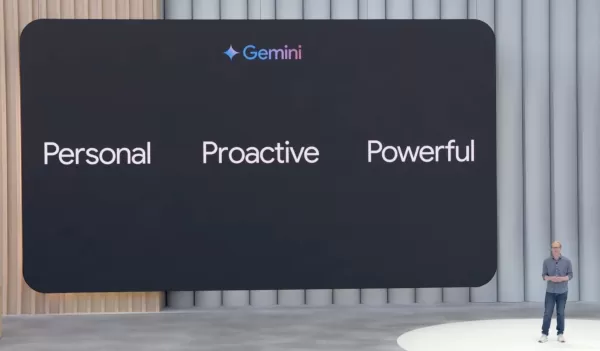 Google AI Ultra Unveiled: Premium Subscription Priced at $249.99 Monthly
Google Unveils Premium AI Ultra SubscriptionAt Google I/O 2025, the tech giant announced its new comprehensive AI subscription service - Google AI Ultra. Priced at $249.99 monthly, this premium offering provides exclusive access to Google's most adva
Google AI Ultra Unveiled: Premium Subscription Priced at $249.99 Monthly
Google Unveils Premium AI Ultra SubscriptionAt Google I/O 2025, the tech giant announced its new comprehensive AI subscription service - Google AI Ultra. Priced at $249.99 monthly, this premium offering provides exclusive access to Google's most adva
 April 24, 2025 at 6:15:25 AM EDT
April 24, 2025 at 6:15:25 AM EDT
AIトラベルプランニングを使って旅行を計画するのが楽しいです!ユニークな目的地を探すのが簡単で、計画もその場で調整できます。ただ、もっと詳細な情報が欲しいですね。😊🌍


 0
0
 April 23, 2025 at 11:00:34 PM EDT
April 23, 2025 at 11:00:34 PM EDT
Mit AI Travel Planning ist das Planen meiner Reisen ein Kinderspiel! Es findet tolle Orte und passt meine Pläne spontan an. Schade, dass es keine Empfehlungen für lokale Aktivitäten gibt. 🚲🌄


 0
0
 April 22, 2025 at 9:54:22 AM EDT
April 22, 2025 at 9:54:22 AM EDT
AIを使った旅行計画は最高です!最後の旅行で使って、知らなかった隠れた名所を提案してくれました。旅程もその場で簡単に調整できました。ただ、予算旅行のオプションがもう少し欲しいですね。それでも、素晴らしいツールです!😊


 0
0
 April 22, 2025 at 6:22:25 AM EDT
April 22, 2025 at 6:22:25 AM EDT
AI Travel Planning은 내 휴가의 구세주예요! 이제 여행을 맞춤화하는 게 너무 쉬워졌어요, 멋진 장소를 찾고 계획을 즉시 조정할 수 있어요. 다만 기분 변화도 예측해줬으면 좋겠어요 😂. 그래도 여행자에겐 필수 앱이에요!


 0
0
 April 22, 2025 at 3:20:43 AM EDT
April 22, 2025 at 3:20:43 AM EDT
AI Travel Planning is a lifesaver! I used it to plan my last trip and it suggested some hidden gems I'd never heard of. The itinerary was easy to adjust on the go. Only wish it had more options for budget travel, but still a solid tool! 😎


 0
0
 April 22, 2025 at 3:02:39 AM EDT
April 22, 2025 at 3:02:39 AM EDT
AI Travel Planning giúp tôi lên kế hoạch du lịch dễ dàng hơn! Nó tìm ra những địa điểm độc đáo và điều chỉnh lịch trình của tôi ngay lập tức. Chỉ mong nó có thêm thông tin về văn hóa địa phương. 🏯🌿


 0
0





























